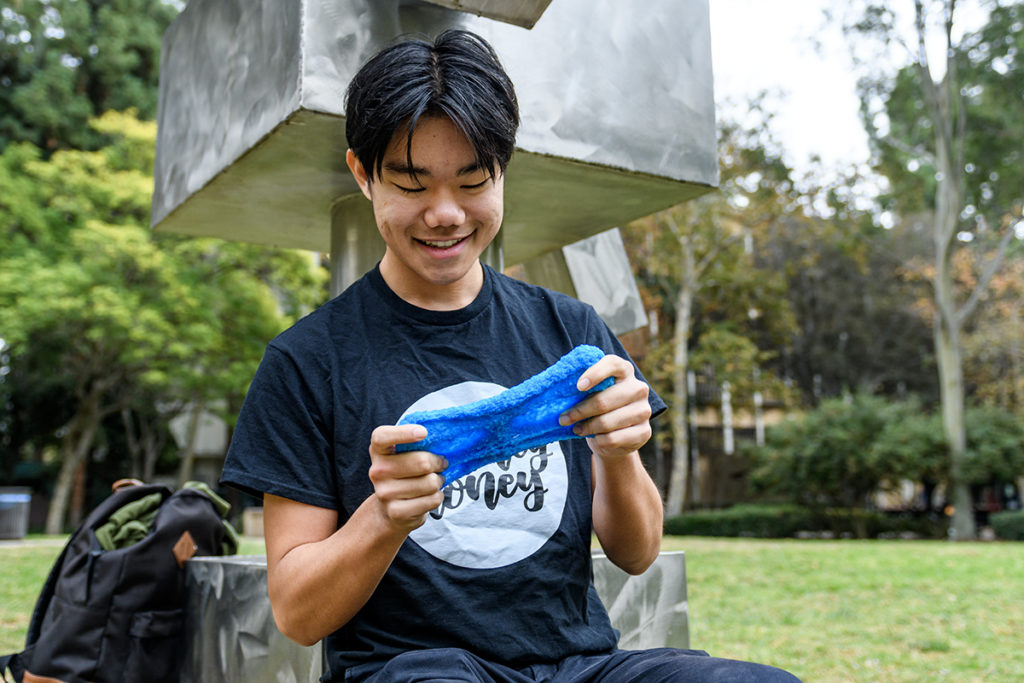Opinion: Student entrepreneurs can explore their passions while pursuing higher education
Sierra Benayon-Abraham poses in front of a stall featuring CC’s Closet Co., the sustainable fashion business she founded at the age of 16. (Courtesy of Sierra Benayon-Abraham)
By Sierra Benayon-Abraham
Jan. 30, 2024 11:32 p.m.
Being an entrepreneur is a state of mind – one that is becoming increasingly popular among undergraduate students.
Starting a business and pursuing higher education are often viewed as mutually exclusive events – two separate realities that cannot exist simultaneously. However, with the rise of undergraduate business programs, the entrepreneurial value of the college experience has never been higher.
According to a 2021 global survey in which 267,000 undergraduate students were pooled from 58 different countries, 11% already owned and ran their own businesses.
Furthermore, directly after graduation, at least 18% of students were keen about becoming entrepreneurs and another 32% hoped to transition into the field of entrepreneurship within five years of graduation.
Over the last decade or so, the rise of startup culture has fostered the creation of incubators and accelerators on college campuses, which provide the resources entrepreneurs need to launch their startups. These spaces are especially useful for those with a minimum viable product who are still in the experimental stage of their business plan.
Student entrepreneurs are now less likely to face the conflicting decision between pursuing a degree first or starting a business. Undergraduates now have a greater chance of success if they do both: launch a business idea inside of a university-founded incubator while simultaneously studying the industry to obtain a degree.
Through the use of various university resources, connections and experiences, student entrepreneurs are likely to find themselves not only succeeding, but thriving in their endeavors.
Mark Lin, a second-year cognitive science and economics student, founded a company called Sliimeyhoney that crafts intricate food-inspired slimes, and was later known for his appearance on the TV show Shark Tank in 2022.

Having founded his business in high school at 15 years old, Lin and his company earned approximately $1 million in sales in 2023 through its e-commerce platform. By following his passion and doing what he loved, Lin was able to develop a sustainable income for himself.
“I feel like there’s support everywhere I look, and I’m honestly grateful for the UCLA community for helping me along my entrepreneurial journey,” Lin said.
Investors are now looking at undergraduate students as the next generation of innovators. In fact, the total contributions from early-stage startup investors have increased from $72.8 billion in 2017 to $208 billion in 2021.
For instance, Tejes Srivalsan, a third-year computer science student, has been working on a startup called Poppin to allow students to find, discover and promote social events on college campuses.
“I definitely see the process of creating businesses and scaling them as something that’s deeply interesting to me and personally rewarding,” Srivalsan said.
Poppin has grown to over 150,000 users and processed over half a million dollars in payments since it launched. Nonetheless, Srivalsan faced challenges trying to balance both academia and his fast-developing enterprise. Thus, he recently made the decision to prioritize his business and take a leave of absence.
“Balancing time is really hard. That’s part of the reason why I’m taking time off now, because I just felt like I was at the point where I couldn’t do both successfully,” Srivalsan said.
Despite societal assumptions, education attainment does not always determine one’s ability to excel in their career. Some of the most successful entrepreneurs in the world dropped out of college.
American fashion designer and billionaire Ralph Lauren never received a college diploma. Rachael Ray, an author, television host and businesswoman with a net worth of over $100 million, never walked across the stage in her college cap and gown. Bill Gates is known to be one of the most successful college dropouts in the world.
Based on these influential entrepreneurs who made it – and made it big – many students ponder whether they need a college degree at all. When reading about college dropout success stories, it is easy to disregard the fact that many of those individuals were provided with existing privilege and generational wealth. But not everyone has the luxury to afford taking a risk on a business venture and avoiding the traditional education route altogether.
Upon weighing the advantages of the one-of-a-kind pioneering opportunities that an undergraduate education presents, the significance of earning a diploma in correlation with entrepreneurship is undeniable.
“There is definitely a lot of value in pursuing an undergraduate degree,” Lin said. “Just being in the college environment and taking those classes, even if the material you’re learning isn’t directly applicable, going through the process and gaining a more holistic understanding of society and an interdisciplinary education is very helpful.”
Srivalsan added that UCLA is sprawling with ample amounts of talent: One just has to go out there and find it.
Many of these like-minded entrepreneurial driven students are found within the Anderson School of Management.
The entrepreneurship minor housed in the Anderson School of Management is taught by graduate school professors and introduces undergraduate students to the field of entrepreneurship.
Lauren Kobashigawa, a fourth-year communication student minoring in entrepreneurship, said pursuing the entrepreneurship minor has not only enhanced her time as an undergrad but has also allowed her to gain a holistic background in the field of business.
Through a carefully crafted core curriculum and a senior capstone experience, students get exposure to a wide variety of concepts and practical implications of the entrepreneurial workforce.
“For my capstone for the minor, which I’m taking next quarter, I actually have to intern at a startup,” Kobashigawa said. “You put everything that you have learned in the classroom into practice.”
Entrepreneurism used to be a relatively novel field, less concentrated in academia and more in practical experience. However, with the recent progression of entrepreneurial undergraduate education, entrepreneurship has transitioned into one of the most widely diverse areas of study.
Daniel Nathanson, a professor of entrepreneurship at the School of Management, earned a doctoral degree in business and took on the role of CEO or president of several different entrepreneurial startups, in addition to several other business endeavors.
“Entrepreneurship is great in terms of academics because I think it brings all these other business disciplines together, whether it’s finance, marketing, entrepreneurship, personality or profiling,” Nathanson said.
I founded my own social enterprise business called CC’s Closet Co. as an ambitious and naïve 16-year-old student entrepreneur. Experimenting with discarded clothing and my trusted sewing machine, I developed a handbag made from recycled fabrics to support sustainability within the fashion industry and give back to the community.
I have clear memories from high school of arriving home in the evening from gymnastics training to begin fulfilling customer orders, hunched over my sewing machine with my chemistry textbook open beside me. The aspects of running a business that used to challenge me have only doubled during my time as an undergraduate student.
Nevertheless, the inimitable value I have gained from my first two years as a UCLA student has been unfathomable, and that does not just include the lessons I have learned in my business venture and entrepreneurship course.
It encompasses every seemingly inconsequential interaction, obstacle and success that has occurred during my time as an undergraduate, which have shaped the person, and thus entrepreneur, I am becoming.
The exploration of the realm of student entrepreneurship on college campuses in America is only just beginning. As the undergraduate entrepreneurial experience continues to flourish, the future of student-founded businesses is open to a continuous surge of development.
“It’s life. You’re learning life and you’re learning business at the same time,” Nathanson said. “Entrepreneurial education is here to stay.”
